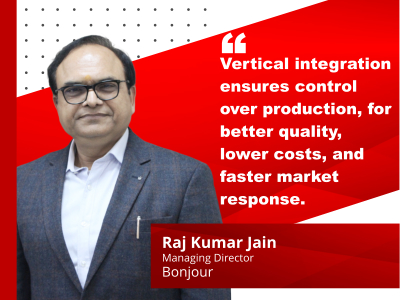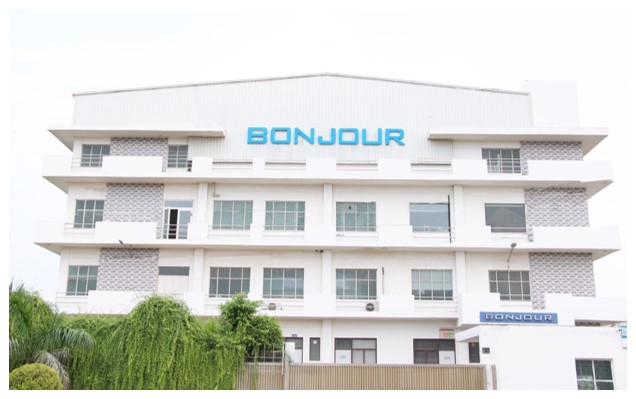Published on: Friday, 01 November 2024 ● 5 Min Read
 In this interview with Mr. Raj Kumar Jain, Managing Director of Bonjour, India’s first multinational socks brand, we gain an in-depth understanding of the company’s approach to large-scale manufacturing, quality assurance, and innovative processes. Established in 1988, Bonjour has become a leader in the socks industry, known for its efficient production capacity and commitment to sustainability. Discover how Bonjour’s use of advanced machinery, vertical integration, and skilled workforce drives its success in the competitive global market.
In this interview with Mr. Raj Kumar Jain, Managing Director of Bonjour, India’s first multinational socks brand, we gain an in-depth understanding of the company’s approach to large-scale manufacturing, quality assurance, and innovative processes. Established in 1988, Bonjour has become a leader in the socks industry, known for its efficient production capacity and commitment to sustainability. Discover how Bonjour’s use of advanced machinery, vertical integration, and skilled workforce drives its success in the competitive global market.
What key factors contribute to Bonjour’s production capacity of 100,000 pairs per day?
At Bonjour, our production capacity is a result of streamlined operations, advanced machinery, and an optimized workflow. We have invested in state-of-the-art equipment and automated systems to ensure smooth and efficient production. Additionally, our skilled workforce, robust supply chain, and efficient resource management allow us to consistently achieve high volumes while maintaining our quality standards.
How do you ensure product quality in such a large-scale manufacturing process?
Quality is at the heart of everything we do at Bonjour. To ensure consistency across our large-scale manufacturing process, we have strict quality control measures in place at every stage. From raw material inspection to finished product checks, we use a combination of automated systems and manual oversight to detect and eliminate any issues. Our dedicated quality assurance team works closely with production to maintain our high standards.
Can you explain the role of your computerized knitting machines in enhancing production efficiency?
Computerized knitting machines play a crucial role in optimizing production efficiency at Bonjour. These machines allow for precision knitting at a faster pace, reducing errors and ensuring consistency. By programming the machines for different designs and specifications, we can switch between product styles seamlessly, which reduces downtime and increases overall output.

How does vertical integration impact Bonjour's manufacturing process and overall business strategy?
Vertical integration is a key part of Bonjour’s strategy. By controlling multiple stages of the production process—from sourcing raw materials to the final packaging—we ensure better cost control, supply chain management, and product quality. This integrated approach also allows us to be more flexible and responsive to market changes, helping us maintain our competitive edge.
What criteria do you use when sourcing materials for your products?
We prioritize quality, sustainability, and reliability when sourcing materials for our products. Our procurement team works with suppliers who meet stringent quality standards and share our commitment to sustainability. We also consider factors like the material’s durability, softness, and performance, ensuring that every pair of socks meets the expectations of our customers.
Can you share any recent innovations in your manufacturing techniques that have improved efficiency?
One of our recent innovations has been the introduction of radio-frequency drying technology, which significantly reduces drying time for our yarns without compromising on quality. We’ve also implemented automation in our packaging lines, which has helped speed up production while ensuring uniformity. These innovations have allowed us to enhance efficiency and reduce energy consumption.
How do you manage workforce training and skill development in your manufacturing facilities?
We believe that our employees are the backbone of Bonjour’s success. Regular training programs, both for new hires and existing staff, ensure that our workforce is equipped with the latest skills and techniques. We also provide specialized training for operating advanced machinery, ensuring safety and efficiency. Continuous learning is part of our culture, and we encourage employees to grow within the company.
How do you respond to fluctuations in market demand while maintaining efficient manufacturing operations?
Flexibility is key when responding to changes in market demand. Our production system is designed to be scalable, so we can quickly adjust output levels to meet demand fluctuations without sacrificing efficiency. We maintain a balance between automated and manual processes, which allows us to adapt quickly to any market shifts, including seasonal trends.
What initiatives has Bonjour implemented to promote sustainability in its manufacturing processes?
Bonjour is committed to sustainable practices. We’ve introduced eco-friendly materials like bamboo and organic cotton into our product lines. Our manufacturing facilities focus on reducing waste and energy consumption, and we’ve implemented water recycling systems in our dyeing processes. Sustainability is not just a trend for us; it’s a long-term commitment to preserving the environment.
How do you envision the future of manufacturing in the fashion industry, and how is Bonjour adapting to those changes?
The future of manufacturing in fashion will be driven by technology and sustainability. At Bonjour, we are investing in automation and digital tools to stay ahead of the curve. We’re also exploring advanced materials that are eco-friendly and performance oriented. With consumer preferences evolving toward more sustainable products, we aim to lead by example by continuously innovating and adopting greener practices.
No comments posted
© 2019 KIVAA Group | All right reserved. www.theindustrial.in
Leave a reply: